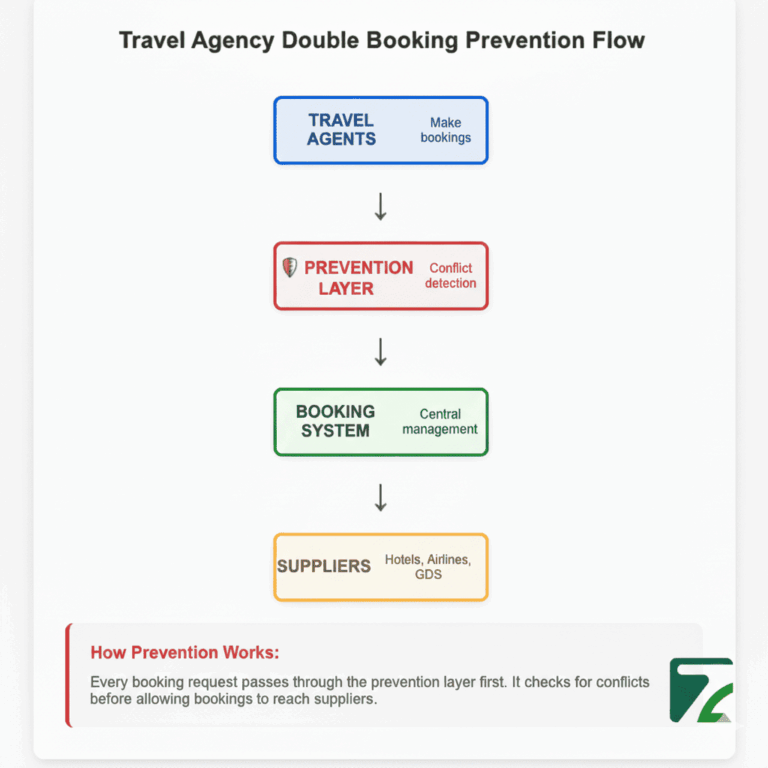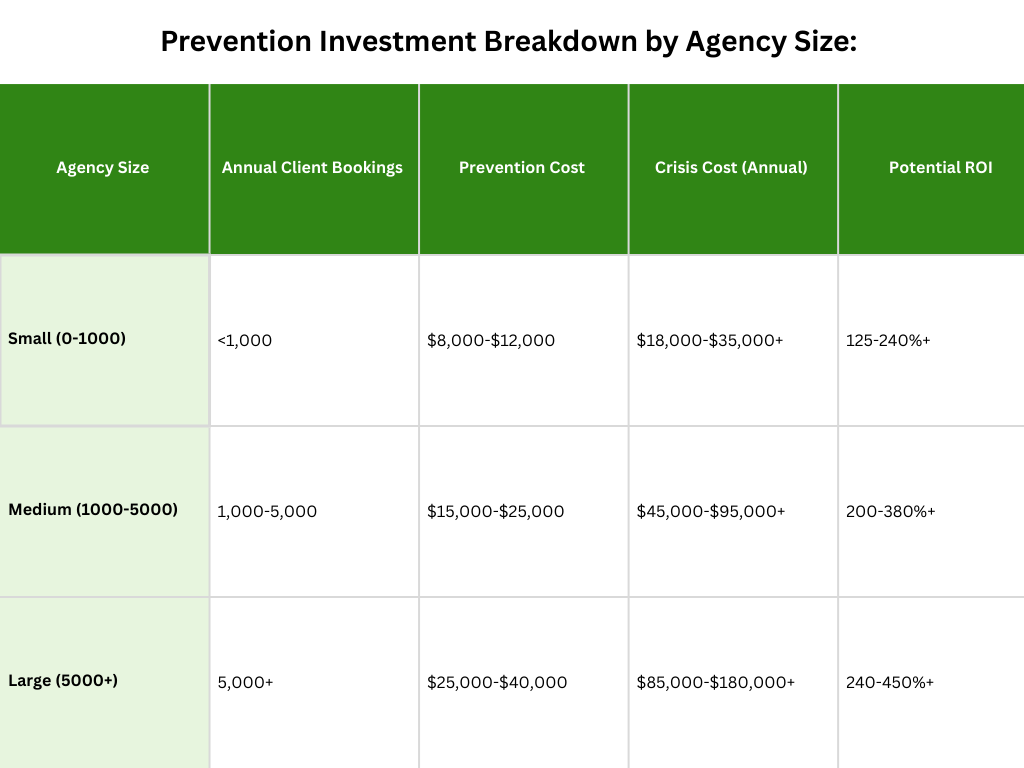Double bookings are one of the most expensive operational mistakes that procurement agencies incur these days. Immediate financial losses and long-term damage to reputation that may take years to recover from are instantly incurred when two distinctly different customers receive confirmed bookings against the same room for hotel, seat for flight, or slot for a tour.
According to Booking. com, 25% of their partners have been double-booked within their first year of being on the platform. For travel agencies, who aren’t raking in huge profits, those two kinds of losses are the immediate hit on the budget and a future loss through a tarnished relationship with the customer hurt.
Studies show double bookings can cost agencies in the thousands of dollars per occurrence and are one of the top reasons clients file complaints. This makes travel agencies especially susceptible to these expensive mistakes because they make numerous types of bookings from various suppliers and spend large amounts of time on customer requests.
When a travel agency finds itself with a double booking, the financial effects are much more than simply the costs to rebook. Many cost categories lead to a lot of expenses that can crush quarterly profits and harm client relationships
At the very least, analysis across the industry has shown the average cost to cover a double-booking incident in the thousands for travel agencies:
The compounding effect results in travel agencies suffering exponential losses over time:
Travel agencies that have several double bookings a year can incur high costs. Systems for Prevention are generally well worth the investment showing rapid ROI in lower crisis cost, better client retention and increased operational efficiency.
It is important to note why double bookings occur if effective prevention strategies are to be developed. According to industry research, travel agencies have four main reasons which cause most booking disputes.
Travel agencies frequently handle client bookings with more than one system like Galileo, Amadeus, supplier’s booking engines, and intranets, without a proper use of integration. This creates gaps in timing, where the same hotel room, tour slot, etc., is being booked for multiple clients at the same time.
Let’s say agent A receives a call at 2 PM, that states we need a certain Paris hotel room for July 15th. They are seeing availability in Amadeus, they know they can offer it to clients, and they are holding it while they receive your customer information. At the same time, Agent B sells the very room in question to another client via the hotel’s own booking tool directly, so when the two bookings are confirmed, there’s a conflict.
This creates a special synchronization problem for travel agencies using a Global Distribution System (GDS) such as Amadeus, Sabre, or Travelport. GDS clashes happen when more than one agent tries to access the same stock at the same time; system time-out errors fail to free (up) reserved stock, or integration delays between the GDS and the agency management system could mean booking gaps.
The majority of travel agencies would have no idea that someone else in the world was querying the GDS at the exact moment they were making a booking, and these tech issue require quite specific preventative techniques that go beyond your standard booking (because millions of travel agencies worldwide are querying the GDS simultaneous).
Double booking incidents are on the rise due to communication breakdowns among individual agents, departments and shifts. Typical culprits are front desk staff taking telephone bookings without manually updating the systems, multiple agents dealing with the same client profile without co-ordination, and incomplete handovers between day shift and night shift staff.
If more than one agents access a complex multi destination itinerary in the absence of a proper communication protocol, then double booking is bound to occur because agent may have booked different segments simultaneously.
Travel agencies rely on several supplier systems such as hotel reservation portals, airline booking systems or tour operator systems, which are liable to failure. API disconnects, server interruptions in peak booking times, or software bugs hindering confirmatory actions often don’t get noticed until after double bookings take place.
These “error instances” need to be monitored and have safety nets in place to avoid client double bookings.
Specialized technology services have been created to help the travel industry avoid the threat of double booking for agencies handling complex client schedules and numerous supplier relationships.
Modern travel agency management systems are the central platform that helps in managing all client bookings, supplier relationships and almost all travel agent’s activities on your system. Such systems offer instant access to all confirmed reservations, automatic conflict identification with from various booking sources, and built-in communication systems for agent communication as well as complete audit trails for monitoring of changes in the booking.
Travel companies need unique GDS integration methods to avoid booking overlap. Queue Monitoring Systems that monitor pending reservations across all linked GDS systems, Timeout Protocols that automatically release stalled held inventory after predetermined wait times, and Backup Inventory Assignment Systems for peak periods.
Superior travel agency systems connect directly to the GDS through certified APIs with real-time access to inventory and auto-remediation. These structures are known to reduce GDS-connected double bookings to a large extent as compared to a manual sequence control.
Travel agencies benefit from specialized software that enables them to combine multi– component bookings for individual clients. These engines “guarantee proper linkage between flights, hotels, tours and transfers, that no customer has an overlapping reservation, and automatic emails whenever someone modifies a flight and it affects the other components for a particular client.
Foremost travel agencies are rolling out AI systems designed to forecast, and avert, booking conflicts in intricate agency worlds.
Machine learning algorithms sift through historical booking trends, seasonal demand patterns and client behavior to flag peak-risk slots for double bookings. These services automatically surface potential conflicts during high booking times and even offer suggestions for avoiding schedule-wracking coordination battles.
Sophisticated machine learning models can assist travel agencies in fine-tuning booking workflows, predict what combination of agents, suppliers and time of booking is most likely to lead to conflicts.
Modern AI systems track the booking flow of all agency systems in parallel and are able to recognize patterns that can be associated with suspicion behavior which might be related to lack of coordination or issues in the system. When potential conflicts are found, the system will automatically notify the management team and can optionally suspend conflicting reservations until they are reviewed manually.

Preventing miscommunications needs changes in the way that agencies operate; they must improve coordination mechanisms at the technological level as well as among people.
All agents should have the same booking processes so no matter who the client books with at the agency, all bookings are handled the same. Critical procedures are to verify all relevant systems before finalizing any item, to update the agency’s administration system with the latest booking entry, to collaborate with other agents working on the same customer and to retain a detailed booking history for reporting audit purposes.
Most failures of coordination are avoided through ongoing communication. Set up transparent shift handovers, enable locking of the client account when multiple agents are collaborating on a booking, standardized updates on booking changes, real time visibility of agent activity.
In cases of double booking even in circumstances in which efforts were made to prevent them, a travel agency is required to respond to the event with professional client communication, honest admission to the coordination mistake, couple of alternative options that are similar or an upgrade if available, and take on any extra costs, such as transportation and accommodations.
Understanding the return on investment for double booking prevention helps travel agencies make informed technology and procedure decisions.

Travel agencies’ annual crisis costs are multiple double bookings of high-value vacation packages, lost repeat customers with great lifetime booking values and replacement costs for experienced agents who leave due to stress of operations.
The vast majority of travel agencies see a positive ROI from rolled out comprehensive prevention systems in just a few months. The long-term returns of client retention and efficiency gains far outweigh most initial investments in the long-run.
Corporate Travel Agency Transformation: A medium-sized corporate travel agency with over 3,000 business trips a year had multiple instances of double booking, particularly disruptive to executive travel. Once it was deployed integrated agency accounting systems with GDS integration and was given full agent training programs, incidents fell dramatically and customers and travel agents were significantly happier and more productive.
Best Practices Crisis Management:
When a luxury travel specialist was hit hard during its peak season by major GDS system outages with consequential multiple executive travel conflicts, they responded professionally, including securing immediate alternative arrangements, which resulted in most impacted corporate clients becoming long-term partners .it’s always the most difficult situations that the power of professional crisis response reveals the greater opportunities to forge long-term business relationships.
Phase 1: Audit and Assessment Map the universe of booking sources, including GDS systems, supplier portals, and direct bookings. Document the existing workflows of agents today, and identify any gaps in coordination that leave windows of vulnerability.
Phase 2: Implementation of the Technology Choose travel agency management systems and GDS integration solutions depending on the volume of clients and booking variability. Implement the real-time coordination tools and check them during the periods of the lowest booking.
Phase 3: Procedure Development Introduce standardized booking regeneration to be performed by all types of agents. Create emergency protocols and daily coordination routines with precise responsibilities.
Phase 4: Training and Optimization Take an agent’s training to perform new coordination system and prevention procedures. Monitor the performance variables and conduct regular procedure updates cause of the operator’s experience.
Double booking prevention creates operational excellence that drives success as an agency grows and clients remain happy. The successful travel agencies build “co-ordination cultures” directed at precision through agent incentive and performance metrics (such as booking accuracies).
Having your travel bookings coordinated by a trustworthy travel agency enhances the client-agency relationship by always ensuring a reliable service, which ultimately optimizes their service experience with a travel agency and in the end leads to more repeated business and a longer client life value. As the world of corporate and leisure travel management grows more complicated, the companies with the best operating platforms stand to become far more competitive.
Double booking is one of the most avoidable and expensive errors travel agencies make. The numbers speak for themselves showing that prevention is much more affordable than reacting to a crisis and it leads to a much better experience for the Clients, the agents, and business profits.
It takes the right technology solutions, packaged with disciplined processes and skilled agent training. The investment in prevention of them is pretty quickly paid for and protects the reputation of the agency and its client relationships for years, if not forever.
The decision that every travel agency faces is simple: invest in prevention now, or keep paying the much higher costs of crisis management. The companies that excel operationally today will lead and win in the competitive travel market of tomorrow.
Your customers rely on you with their most prized travel moments. Your enterprise deserves the certainty and success associated with superior quality and service. Now is the time to act – review your booking coordination procedures and put these preventative strategies in place to protect your agency for the future
Double bookings usually happen due to manual coordination errors, GDS integration delays, poor internal communication, or supplier system failures. When multiple systems aren’t synced in real time, two agents or platforms can confirm the same inventory for different clients.
They lead to immediate financial losses (rebooking costs, refunds, lost commissions) and long-term damage such as client churn, negative reviews, strained supplier ties, and even staff burnout from crisis management.
Agencies can adopt centralized travel agency management systems, certified GDS integration tools, and AI-powered monitoring solutions that track inventory in real time, detect conflicts, and alert agents before issues escalate.
Set standardized booking procedures, enforce clear agent handoff protocols, maintain real-time booking visibility, and conduct regular training so every agent follows consistent, error-proof workflows.
Act fast with transparent communication, apologize professionally, and offer equal or upgraded alternatives at no extra cost. Cover all additional expenses, show empathy, and follow up afterward to rebuild client trust.

Travel Automation Expert